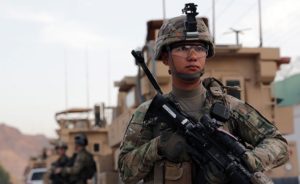
Here in Kabul in early June, outside the home of several Afghan Peace Volunteers, a large drilling machine is parked on what was once a lovely garden. To this now muddy patch, workers will soon arrive for another noisy, dusty day of digging for water. The well dried up a week ago. As of today, the household has no water.
Across Kabul, numerous households face similar water shortages. With an average annual rainfall of just fourteen inches, Kabul’s water table has been falling each year. The current population, estimated around 4.5 million, is expected to reach 9 million by 2050. The estimated groundwater potential is enough to supply only 2 million inhabitants with water.
Alarming reports say that drought now afflicts twenty-one of Afghanistan’s thirty-four provinces.
Rural families in drought-stricken areas watch their crops fail and their livestock die of dehydration. In desperation, they flee to urban areas, including Kabul, where they often must live in squalid, sprawling refugee camps. In the city, an already inadequate sewage and sanitation system, battered by years of war, cannot support the soaring population rise.
Droughts in other countries have led to violent clashes and civil wars. It’s difficult to imagine that Afghanistan, already burdened by forty years of war, will escape eventual water wars.
Ordinary Afghans could be forgiven for feeling paralyzed and defeated by controlling elites who ignore their most basic human needs. Yet every day, Afghan communities reject continued war and call for peace.
On May 13, a single-file procession of Pashto men started off on a 400-mile trek along dusty roads from Helmand to Kabul, to call for the Afghan government and the warring parties to end the war.
The participants are asking the Afghan government and militants to stop fighting. They are walking during Ramadan, the month when observant Muslims fast from food and water between sunrise and sundown, becoming ever more mindful of people who lack water and food.
During the past three weeks, throngs of people in cities and towns along their route have shown solidarity with the walkers.
My young Afghan friends show steady resilience in the face of war and destitution. They are growing up with a keen sense of the importance of water for life and the essential need to share resources. They also know the importance of resisting those who menace people with military might.
In this unpredictable time, I can’t help but wonder at Afghan people, scarred by war, facing drought and impoverishment, digging deep into their rich cultural and historical resources to take a lead in efforts to abolish war and build a better world.
A version of this article initially appeared in The Progressive.
